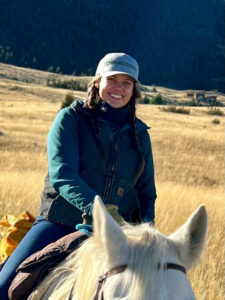Two of WTI’s newest employees attended their first Transportation Research Board (TRB) conference in January, 2022. We asked them to share their experiences.

Jen MacFarlane: This was my first time at TRB and my experience focused on attending sessions and meetings related to public health, walking, bicycling and other physical activity-related content. I was particularly impressed with the Committee on Transportation and Public Health, which was officially formed in 2020 while the COVID-19 pandemic brought to light the diverse impacts of transportation on health. Although the committee’s name may seem a bit vague, its purpose is to further investigate and understand transportation as a social determinate of health as well as increase knowledge of the positive and negative health impacts of transportation policies, procedures, and actions. The Committee connected me with researchers who have similar interests to mine and allowed me to learn from their experiences.
I used my free time to attended sessions related to bicycling trends pre- and post-pandemic, and several sessions related to equity, as well as a whirlwind of lectures, posters, and other fantastic learning opportunities. I appreciated the venue, housing coordination, and a chance to experience Washington, D.C. I was particularly impressed by the city’s pedestrian infrastructure and the amount of time allotted for pedestrians to cross the street. In the daylight, I felt safe. This made physical activity an easy choice and allowed me to get out for a run on the Mall and around the Capitol. The combination of city life and mental stimulation from the conference could be a little overwhelming at times, however, I look forward to returning next year!

Anna Price: I am so grateful to have attended TRB as an educational opportunity. It was not only my first TRB, but my first professional conference – what an experience! I’ve rarely learned so much, made so many new friends, and had my feet hurt so acutely (people: never go to a conference having only packed heels). I was free to participate in the meetings and panels of my choice but made it my goal to attend as many WTI employee events as possible. Our researchers gave poster presentations (including our two Public Lands Transportation Fellows – congratulations Pat and Charlie!), chaired committee meetings, shared their expertise as panelists, and facilitated other events.
I used the rest of my conference time to explore other transportation topics, from ferry system electrification to evacuation planning, to connecting MPOs with grant writing and management resources. The world of transportation research, construction, development, policy, and management is wide, more so than I appreciated, and now is an exciting time to be a transportation professional. As David Kack referenced in A Note from Our Director, the passage of the Bipartisan Infrastructure Law (BIL) is a “once in a generation” opportunity for transportation equity, innovation, maintenance, and improvements. From the optimism and energy I saw at TRB, it is clear that many people are finally able to pursue projects that were previously impossible and, as a young professional, it is inspiring to see the real, meaningful impacts to be made every day.
It was also obvious that the same four topics were at the forefront of everyone’s mind and, no matter the meeting or discussion, they were explored again and again: first, the climate crisis is upon us, and the transportation world must incorporate new and solutions-based management strategies in response; second, equity must be incorporated into all aspects of transportation, and once a system is equitable no part of it should remain unchanged; third, transportation governments are most impactful when they invest in young people and partner with organizations on a local level; and fourth, transportation governments should focus on making small, but highly transformational, monetary investments – a detailed, solution-driven project that costs $200,000 can be more impactful in a small, rural, or underserved community than a $2M project implemented elsewhere.
Attending TRB for the first time exposed me to the variety of the transportation world, but more importantly it made obvious the deep well of collective knowledge here at WTI. Watching my coworkers share their research, lead in committees, and have the clear respect of their peers underscored their expertise. Attending TRB reiterated the current and potential impact of working at WTI.
